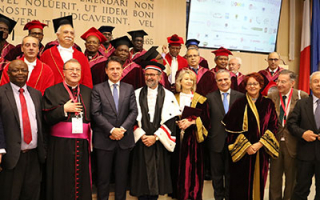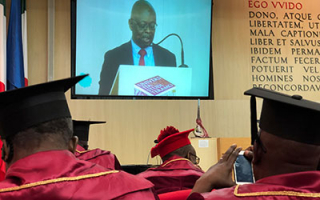The time to change behaviours, mindsets and approaches is now. This was the spirit behind discussions that took place on 21 June in the Italian city of Teramo, between a diverse group of University Rectors and cultural heritage experts representing 19 different African countries. The African University Rectors Conference, held during the “II International Forum of Gran Sasso” was an opportunity to take a fresh look at heritage protection in Africa from the point of view of prevention and the creation of opportunities for the next generation.
The event was co-organized by ICCROM, together with the University of Teramo and the Diocese of Teramo-Atri, under the auspices and financial support of the Italian Ministry of Foreign Affairs and International Cooperation. As a component of a larger forum for university and research experts from across Europe, discussions were enriched by the variety of disciplines represented around the table – from veterinary sciences to philosophy to archaeology.
With universities on the front line for shaping the next generation of experts, they are in a prime position to advocate for innovation in protecting heritage resources, but also using heritage to create opportunities and provide wellbeing to communities. Connected to this, however, is the need for an honest and in-depth analysis of who currently benefits from preservation efforts, what are the root causes of poverty, and what are steps to empower local communities and stakeholders.
Participants agreed that the creation of policies, guidelines, learning curricula and realistic solutions must come from Africa for Africa. In this context, those representing institutions in Europe and especially Italy, also underlined their desire to create new and concrete avenues for equitable cooperation and knowledge sharing.
“Creating democratic spaces on the African continent is paramount, and universities are key to ensuring this is possible,” said Webber Ndoro, ICCROM’s Director-General. “All fields in this sense are relevant, because they all aim to improve human wellbeing, and culture is at the heart of wellbeing.”
This sentiment was shared by the other speakers, both on 21 June during the event, and on 22 June during the closing ceremony, where high-level speakers included H.E. Mons. Lorenzo Leuzzi, Bishop of the Diocese of Teramo-Atri; Dino Mastrocola, Rector of the University of Teramo; Giorgio Marrapodi, Director General for Development and Cooperation of the Italian Ministry of Foreign Affairs; Mariachiara Malaguti from the Università del Sacro Cuore in Rome; and Gihane Zaki, Director of the Egyptian Academy in Rome and ICCROM Council Member.
The closing event on 22 June also enjoyed a special visit paid on the part of the Italian Prime Minister, Giuseppe Conte, who was presented a copy of the Teramo Declaration, signed by the participants and partners of the conference.
“It is a source of great honour and pride for me to receive this ‘Charter’, and I will cherish it preciously, because it confirms the natural calling of opening Italy – a nation projected on the Mediterranean – towards the African continent,” stated Conte in his address. “This charter of intent, which has been signed, recognizes that education, dialogue and research play a primary role in safeguarding and respecting the cultural and natural heritage of the world, and that education is essential for the promotion of people, and the promotion of sustainable development.”
ICCROM thanks all of the partners and participants for their contribution to the quality of discussions and success of the event, and to the Italian Directorate General for Development Cooperation for its financial contribution, which made the conference possible.


